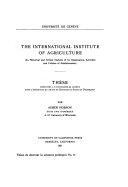
Penelitian dibidang ilmu ekonomi pertanian dan beberapa metode pengambilan tjontoh
Buku penuntun bagi mahasiswa tingkat sardjana Fakultas Pertanian, Institut Pertanian Bogor ...
- ISBN 10 : UOM:39015069890245
- Judul : Penelitian dibidang ilmu ekonomi pertanian dan beberapa metode pengambilan tjontoh
- Sub Judul : Buku penuntun bagi mahasiswa tingkat sardjana Fakultas Pertanian, Institut Pertanian Bogor ...
- Pengarang : I. Gusti Teken,
- Kategori : Agriculture
- Bahasa : id
- Tahun : 1965
- Halaman : 90
- Halaman : 90
- Google Book : http://books.google.co.id/books?id=B51XAAAAMAAJ&dq=intitle:metode+penelitien+perbankan&hl=&source=gbs_api
-
Ketersediaan :
A bank may subscribe to several financial services the better to supply the needs
of its clients ; similarly , the Institute is in position to assist governments through its
correlated study of the phases of ORGANIZATION AND PROGRAM 101.









